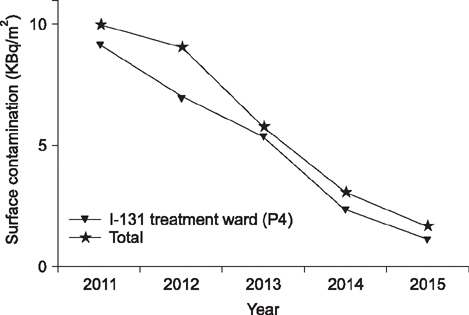Prog Med Phys.
2016 Sep;27(3):146-155. 10.14316/pmp.2016.27.3.146.
Analysis of Trends in Dose through Evaluation of Spatial Dose Rate and Surface Contamination in Radiation-Controlled Area and Personal Exposed Dose of Radiation Worker at the Korea Institute of Radiological and Medical Sciences (KIRAMS)
- Affiliations
-
- 1Department of Medical Physics, Kyonggi University, Suwon, Korea.
- 2Korea Institute of Radiological and Medical Sciences, Seoul, Korea. haijo@kirams.re.kr
- KMID: 2376545
- DOI: http://doi.org/10.14316/pmp.2016.27.3.146
Abstract
- As the probability of exposure to radiation increases due to an increase in the use of radioisotopes and radiation generators, the importance of a radiation safety management field is being highlighted. We intend to help radiation workers with exposure management by identifying the degree of radiation exposure and contamination to determine an efficient method of radiation safety management. The personal exposure doses of the radiation workers at the Korea Institute of Radiological & Medical Sciences measured every quarter during a five-year period from Jan. 1, 2011 till Dec. 31, 2015 were analyzed using a TLD (thermoluminescence dosimeter). The spatial dose rates of radiation-controlled areas were measured using a portable radioscope, and the level of surface contamination was measured at weekly intervals using a piece of smear paper and a low background alpha/beta counter. Though the averages of the depth doses and the surface doses in 2012 increased from those in 2011 by about 14%, the averages were shown to have decreased every year after that. The exposure dose of 27 mSv in 2012 increased from that in 2011 in radiopharmaceutical laboratories and, in the case of the spatial dose rate, the rate of decrease in 2012 was shown to be similar to the annual trend of the whole institute. In the case of the surface contamination level, as the remaining radiation-controlled area with the exception of the I-131 treatment ward showed a low value less than 1.0 kBq/m², the annual trend of the I-131 treatment ward was shown to be similar to that of the entire institute. In conclusion, continuous attention should be paid to dose monitoring of the radiation-controlled areas where unsealed sources are handled and the workers therein.
Keyword
Figure
Reference
-
1. Korean Association for Radiation Application: Survey on the Status of Radiation/RI Utilization in 2014. Seoul: 2016. pp. 3-5.2. Seok GK, Yong MK, Chang KK, Ho YY, Si YJ, Eun OH. In: Radiat Sci. 2012. Introduction to radiation management; pp. 3-5.3. Jai KL. Elements of radiation protection. Korean Assoc Radiat Appl. 2016; 2:607–613.4. Park JK, Cho EH. Measurement of the spatial dose rate for distribution room in department of nuclear medicine. J Digit Contents Soc. 2012; 12:151–157.
Article5. Tack HH, Kang SC. Development of automatic smear equipment for measuring surface radioactivity contamination. J Korea Ind Inf Syst Soc 2011:37-44.6. Jai KL. Elements of radiation protection. Korean Assoc Radiat Appl 305;1:268-283. 305-311.7. Nuclear Safety Act No. 13545: Definition of Radiationcontrolled Area. 2016.8. Enforcement Ordinance of Nuclear Safety Act No. 2: Definition of Dose Limit. 2016.9. ICRP Publication 94: Release of patients after therapy with unsealed radionuclides. Ann ICRP 2005;34(2):53-55.10. Radioisotope Journal: Measurement of the spatial dose rate 2002;17(2):97-102.11. Notification of Nuclear Safety and Security Commission No.14: Limit of external radiation rate. 2014.12. Moon JS, Park DS, Kim SK, Jeong HI. A study of measuring the surface contamination for patient\'s clothes and bedclothes after ablation therapy. Korean J Nucl Med Technol. 2008; 12:3–12.13. Article of Nuclear Safety and Security No.2014-34: Reference about Radiation Protection. 2014.
- Full Text Links
- Actions
-
Cited
- CITED
-
- Close
- Share
- Similar articles
-
- A Study on Patterns of Dose for Radiation Workers in Korea
- Evaluation of Dose Distribution Using a Radiophotoluminescence Glass Dosimeter in Biobeam8000 Gamma Irradiation Device
- Changes of Optically Stimulated Luminescence Dosimeter Sensitivity with High Dose
- A Feasibility Study of Novel Real-Time Personal Dosimeter with Position Monitoring
- Clinical application of remotely controlled afterloading apparatus using high dose rate sourses




